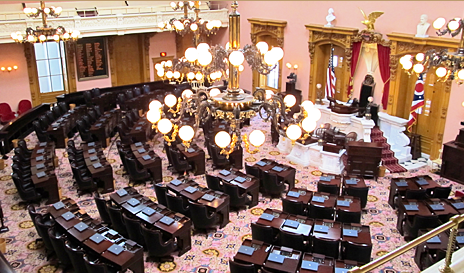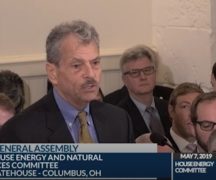The state representative wanted to explain his opposition to bailing out two failing nuclear power plants owned by FirstEnergy Solutions.
A high-powered lobbyist, who federal prosecutors allege was involved in a $61 million racketeering scheme operated by the Speaker of the House and others in his “enterprise” to pass the bailout, wasn’t having it.
“No one cares about your opinion,” Neil Clark, a lobbyist with Grant Street Consultants allegedly told the lawmaker, identified only as “Representative 7.”
Prosecutors alleged in a sweeping, 81-page affidavit that Clark, House Speaker Larry Householder, his adviser Jeff Longstreth, lobbyist and former GOP Chairman Matt Borges, and FirstEnergy lobbyist Juan Cespedes ran a scheme to use FirstEnergy funds to power the bailout through the Statehouse.
Householder and co-conspirators attempted to influence lawmakers into passing HB 6 after receiving millions of dollars for personal and political gain from the Akron-based utility company, prosecutors say. They described it as the largest case of public corruption in state history.
As the FBI questioned “Representative 7” on May 28, 2019, the lawmaker received a text from Householder about the bailout legislation, House Bill 6. It was due for a vote the next day.
“I really need you to vote yes on HB 6, it means a lot to me. Can I count on you?” the Speaker allegedly texted the lawmaker.
Prosecutors didn’t specify the lawmaker’s identity but noted “Representative 7” voted against HB 6. So Clark, according to a recorded phone call, advised Householder to kill an unrelated bill that “Representative 7” sponsored.
By May 31, however, an intermediary delivered an offer from Longstreth, who managed Householder’s campaign operations for Republican candidates.
“Longstreth reportedly told Individual 2 to instruct Representative 7 to delete the text messages that he received about HB 6 from Householder” prosecutors wrote in the affidavit.
“If Representative 7 complied with this instruction, all would be forgiven in terms of his vote against HB 6.”
The episode is a striking example of the aggressive and allegedly illegal sausage-making at play in the seat of state government. It also indicates at least one member of the House of Representatives has known the FBI was investigating people and events surrounding HB 6 for more than a year.
When the lawmaker sat down with the FBI one day before HB 6 passed, he or she remarked that HB 6 had been handled unlike any legislation he’d ever seen, and it looked like Householder didn’t have the votes.
Representative 7 told investigators he had daily contact with Clark and thought they were friends.
Clark allegedly told the lawmaker, who relayed the conversation to the feds, that “people who vote against Householder lose a lot, including committee chairmanships, caucus financial aid, and that their legislation may not continue to legislatively progress.”
Whether that was advice from a friend or a threat from Householder was unclear to the lawmaker, who knew the resources Householder could withhold from a campaign.
The feds claim to have call logs that support the allegation that Householder asked the lawmaker to delete the texts.
The affidavit does not explicitly specify the identity, gender or party affiliation of the lawmaker or the details and fate of the unrelated legislation.
However, the affidavit does refer to the lawmaker using a male pronoun.
He is likely a Republican, given the threat of withholding caucus funds or committee chairmanships.
A faction of 38 lawmakers, including 15 Republicans, voted against the bill, which was eventually signed into law.





